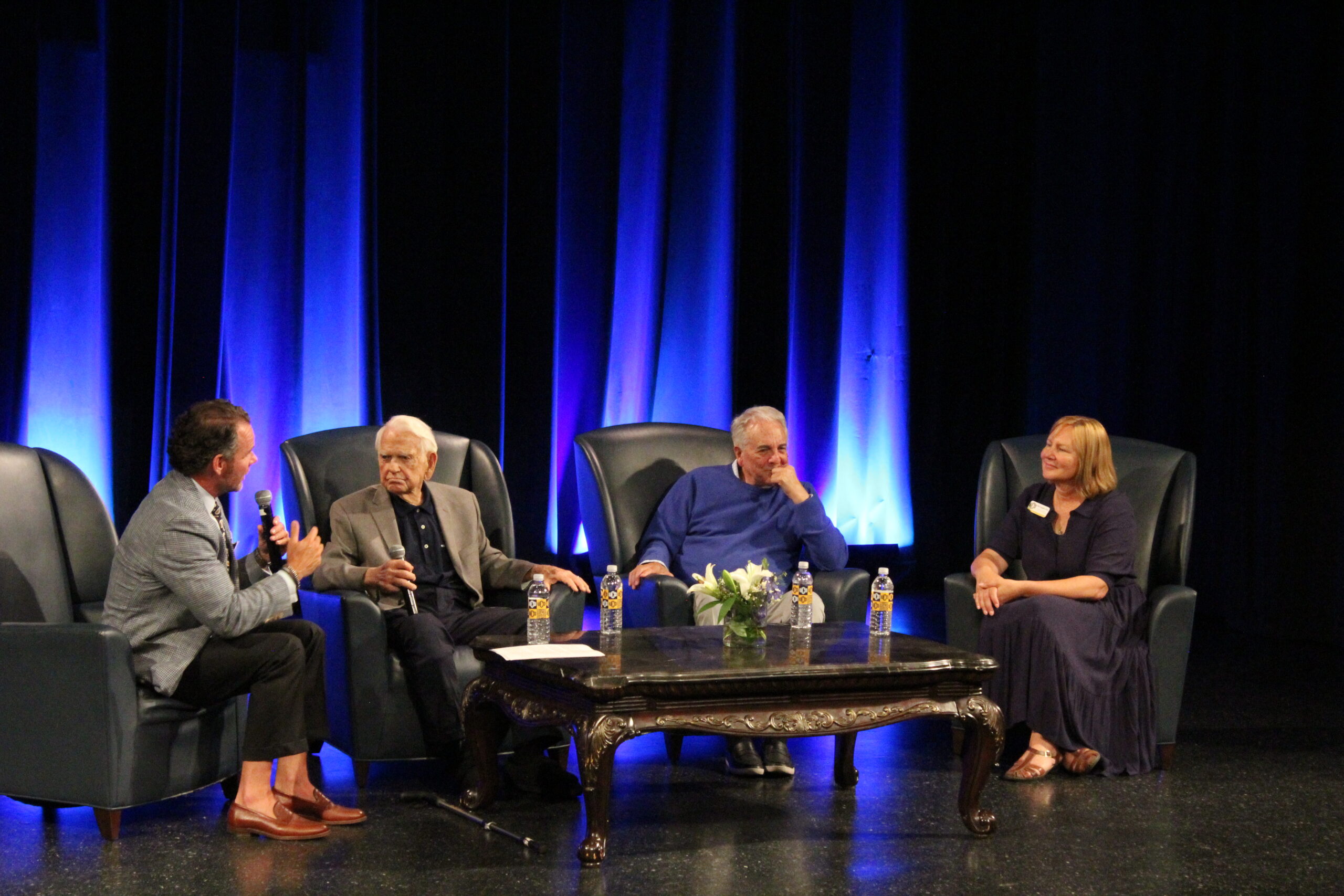UCO History Panel held in week of inauguration events
Peyton Cleek
Reporter
The University of Central Oklahoma held a history panel moderated by UCO President Todd Lamb on Wednesday, April 24 in honor of his inauguration. The panelists included George Nigh, Roger Webb and Patricia Loughlin, history professor. The panel included information on UCO’s history as an institution, and Nigh and Webb’s personal experiences during their involvement at the university.

President Lamb talks UCO history with George Nigh, Roger Webb and Patricia Loughlin. (JESSEY KOLLIE/THE VISTA)
On Dec. 24, 1890, the Oklahoma Territorial legislature created three schools of higher education; the agricultural and mechanical college in Stillwater (later renamed Oklahoma State University), the state university in Norman (later renamed the University of Oklahoma), and a normal school for education in Edmond (later renamed University of Central Oklahoma). UCO was the first of the three schools to hold classes in 1891, and Old North was the first building on its campus, making it one of the oldest structures built for higher education in Oklahoma Territory.
George Nigh, “a man that’s been introduced more than any man in Oklahoma” according to Lamb, was UCO’s 18th president and is the eighth and 10th governor of Oklahoma. He also is the first to have won all 77 counties’ votes for governor.
When sharing his experiences with UCO, Nigh reflected on his presidency from 1992- 97. He said he remembered when Broncho Lake was first built, and that it was a practice field that often flooded, so it was turned into a 1.5 acre lake. He said he and the students danced around it when it was unveiled. He recalled that former President Bill Clinton visited the campus twice to speak, because Nigh wanted the school on national television, and said Clinton wanted the stage that he spoke on in front of Old North.
“I was just so impressed by the support, at the management; it was just wonderful to be here. It’s impressive what UCO has been able to do,” Nigh said.
Roger Webb was the 19th president of UCO and established UCO’s forensic program, the Academy of Contemporary Music at UCO and the UCO Jazz Lab.
“There’s no one that had a greater influence on my life than George Nigh,” Webb said. “The resiliency of the faculty that came and started the university, well, that’s a perfect word because that’s what they were.”
He said people volunteered to put stones on the Old North building, and 17 years before statehood, UCO became the symbol for education in Oklahoma. He said early teachers at UCO were not only taught reading, writing and rhythmic, but also ethics and morality, and they’re still great models for citizenship today.
“It makes you so proud to be a part of it, and what a great role we’ve had”, he said to the other panel members. He talked about the importance of students leaving UCO with more than just an education and how learning to be a leader will always be a tenure for the college. Randall Stevenson, president of AT&T and UCO alumni, came to speak at UCO, and Webb said he remembers him saying, “This is a real university, in every sense of the word.”
Loughlin served as chairperson for the Department of History and Geography at UCO from 2014-18. She is currently working on an Oklahoma history textbook for eighth and ninth graders.
Loughlin said to Nigh that he created the roadmap and vision for UCO and called the other panelists all “visionary leaders.”
“So many students come from all around the United States and the world for the forensic science program,” she said.
Regarding UCO, she said, “It has care and compassion. Faculty know student’s names.”
In a post-panel follow-up interview with Katrina Lacher, chair of the UCO history department, and Loughlin they gave background information on the panel.
“Provost Simmons approached me as they were putting together ideas for the inauguration week festivities and said we would like history to be kind of on everyone’s radar as we kind of go into this official university event,” said Lacher.
“I thought the themes that overlapped from everyone’s comments that the intersection of those about community and about partnerships and about administration and faculty and staff and students working together; I thought that that was a really special moment,” she said. “That’s something that is really endured overtime, like you say, and it’s one of the things that makes UCO so special is that there is this connection and that students can come up to faculty and ask these questions and engage in this dialogue and you don’t get that everywhere. I’m excited to be a part of history in the making. As cliché as that sounds, I believe in it.”

